What Can Sewage Teach Us?
The Government U-turn on the Environment Bill about what water companies’ responsibilities are when it comes to dealing with sewage provides some valuable lessons for public affairs.
The Guardian, and others, have been writing regularly on the issue but to summarise briefly, an amendment tabled in the Lords to the Bill, demanding that water companies prevent sewage discharges, was rapidly rejected by Conservative MPs.
There then followed a huge backlash, mainly on social media, complaining about the decision and ‘naming and shaming’ MPs who were to paraphrase ‘allowing water companies to pollute rivers’. It seemed that many MPs hadn’t really appreciated what they were voting on in this case.
The whole uproar enabled the issue to be aired extensively across the media and brought with it sufficient pressure to force the Government into promising its own amendment to deal with the issue.
So, what does it all mean from a public affairs perspective?
Politically sensitive: the issue ‘benefitted’ from being an issue of importance locally to many Conservative MPs, especially in ‘blue wall’ seats. The Lib Dems, and others, have been given an election leaflet gift for the next election and the Government had to do something quickly to try to neutralise the issue. We are also entering the start of the COP 26 summit so allowing the pollution of rivers looks bad.
Spokespeople: frankly, you can never have too much Feargal Sharkey who makes excellent, well-informed contributions and brings a profile with him as well. He was able to make the case for change clearly across the media. But from the Government’s perspective, their supporters tried to say it wasn’t really an issue, it was a concocted social media outrage mob, it was simply too expensive to deal with or wasn’t needed as the powers to take action were already available. So, a confused approach and one that ultimately undermined but the Government U-turning (which has been the case in the past on issues as well which may put supporters off in future).
Well organised: supporters were ready and willing to be marshalled to act. They knew what to do and how to do it. It also shows the importance of social media in public affairs as well as combining that with other communications channels as well.
Solution: having a ready-made option, in this case an amendment, is essential. It is constructive and shows that any issue can be solved rather than just moaned about. It also puts others, in this case the Government, on the backfoot. They were scrambling around to explain why they weren’t taking action.
Parliament: it was important to have supporters in Parliament focused on an agreed way forward. This raised the profile of the issue in the first place but also ensured that the pressure could be maintained, especially in the House of Lords.
None of these things happen by accident. So, it comes down picking the issue, appreciating the political setting and the pressure on MPs and Government, having media plans (not least social media) with a respected figure head, a solution and frankly supporters organised to take action (inside and outside Parliament).
If you can factor these into your public affairs strategy, then you have a chance of success.

